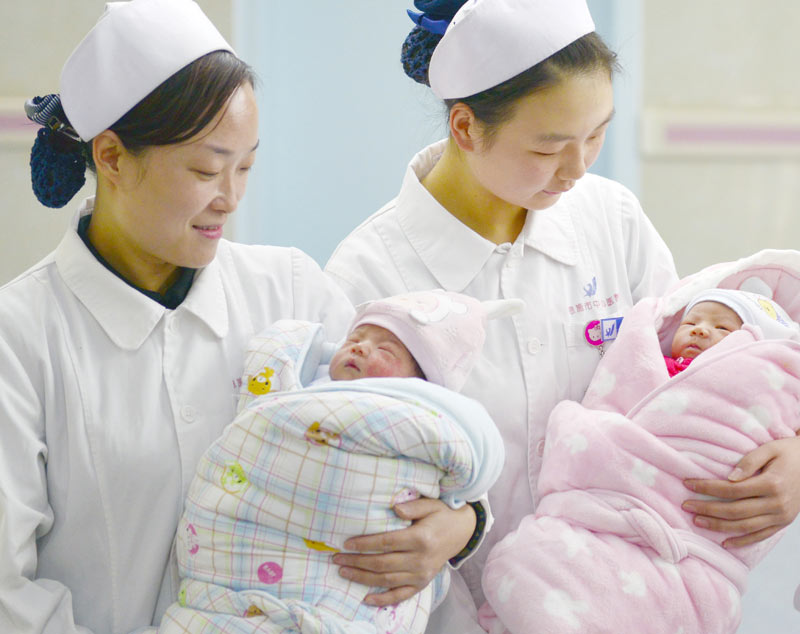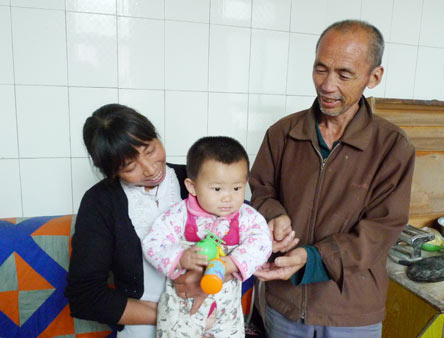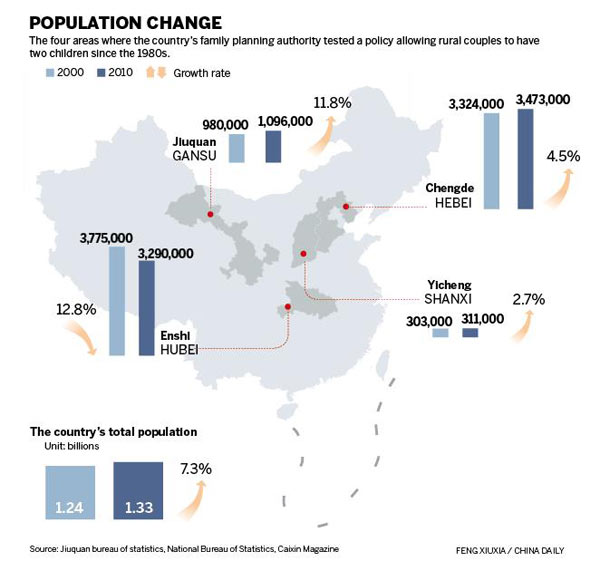Editor's note: The relaxation of China's decades-old family planning policy to allow more couples to have a second child has been hailed as one of the key events of 2013. China Daily sent reporters to examine how the policy change is expected to affect people’s lives.
 |
|
Obstetric nurses in the Central Hospital of Enshi, Hubei province, take care of newborns at the hospital. Couples in Enshi are allowed to have two children. Li Yuanyuan / for China Daily |
Many residents in pilot area opted against adding to family, often due to finances
|
 |
|
Su Meiling and her father-in-law play with her second child at their home in Yicheng county, Shanxi province. Su and her husband Qiao Weijie had the daughter last year. Xu Wei / China Daily |
However, the couple changed their minds in 2011 and had a daughter, even though, according to the rules, they had to give back the subsidies —more than 4,000 yuan in total.
"We just realized one child is not enough," said Su, 38. "If we had two, we knew they'd be companions for life."
Su and Qiao live in Yicheng, a typical rural county in Shanxi province rich in coal resources. It is one of four areas chosen by the central government in the 1980s to test a policy allowing families to have two children.
In November this year, a decision was made to relax the one-child policy across the whole country. Couples in which one partner is an only child will be allowed to have a second child, according to a decision by the Communist Party of China leadership.
Despite fears of a population boom, demographic indicators from Yicheng suggest giving couples the option to have a second child does not necessarily lead to robust population growth.
Between 1982 and 2010, a time span that encompassed the third and sixth national census, the county's population grew by 22.8 percent, from 254,000 to 311,000, compared with the national average of 29.8 percent. In Shanxi it was 41.2 percent.
Yicheng has a gender ratio of 101.6 men for every 100 women, according to the 2010 census, while the national figure for men was 105.2.
Liang Zhongtang, a demographer with the Shanghai Academy of Social Sciences who helped facilitate the pilot program in 1985 and has monitored it since, said he has noticed a drastic change in people's concept of fertility since the 1980s.
"The lessons we can draw from the pilot program in Yicheng is that a loose population policy does not necessarily mean that the population will grow out of control," he said. "Plus, even though some areas enforce a strict one-child policy, the goal of population control has not been met."
Proposal approved
In the early 1980s, Liang, who was then a researcher at the Shanxi Provincial Party School, made the proposal to the central government to test his plan to contain population growth.

In September 1980, the Party Central Committee issued an open letter to all members of the Party and the Youth League, suggesting couples should only have one child to keep the population under 1.2 billion, to reduce the mounting pressure on resources and the environment.
Liang disagreed with the one-child policy, holding that the country could still effectively meet its target of keeping the population under 1.2 billion by allowing every couple to have two children while delaying the age of marriage and the age they could have children.
The central government approved Liang's proposal and Yicheng was selected because of strong support from the county's top officials.
Liang applied his test in the county's rural areas because giving birth to more than one child was more popular among rural couples before the family planning policy, and rural households are more prone to violating the policy.
Before the pilot program in Yicheng, Wang Yongliang, a family planning official in Wangzhuang township for about 30 years, said his job was "the most difficult in the world".
"People were giving birth to at least four or five children before the 1970s, and all of a sudden they are ordered to have only one," he said, adding that the policy resulted in conflict between family planning officials and couples.
"Every time you went to a village, people said, ‘Here come the gangsters'. They would curse you behind your back," he said. "If we knew a woman was pregnant but already had a child, we tried all means to convince her to give up the baby — taking all the family's precious belongings, tractors, cattle and giving them back immediately after they agreed to abort the child."
In 1985, when the county started pushing the pilot program, many family planning officials were shocked.
|
|
|
|
|
|
|
|